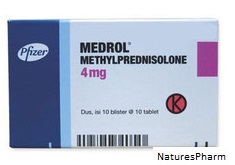What is Medrol?
Medrol is a medication that belongs to a group of drugs called synthetic, or man-made, corticosteroids. These are naturally occurring chemicals produced by the adrenal gland, and they affect the metabolism in different ways while modifying the immune system. The use of Medrol was approved by the FDA in 1957.
This medication is taken by patients to get fast suppression of their inflammation. Doctors prescribe it for such conditions as arthritis, ulcerative colitis, severe allergic reactions, asthma, dermatitis, chronic skin conditions, psoriasis and others. Sometimes, Medrol is also used to treat multiple sclerosis and shock, although its intake for such conditions is controversial.
Before starting this treatment, doctors need to know whether their patients have any possible allergies. Inform them about your medical history, especially if you have such conditions as blood clots, bleeding issues, osteoporosis, eye diseases, diabetes, heart diseases, past or current infections, liver and kidney problems, mood and mental changes, intestinal or stomach conditions, seizures and some others. The use of Medrol can make some patients feel dizzy, so it’s not advisable to drive or do other things that require full alertness. In rare cases, this medication may lead to stomach bleeding, and drinking alcohol regularly only increases this risk. Users need to limit the consumption of any alcoholic beverages while undergoing this treatment. Medrol may also make them more likely to get new infections, so they should be careful.
There are certain meds that shouldn’t be taken when using Medrol because of possible drug interactions and increased health risks. For example, patients aren’t allowed to combine it with such drugs as macrolide antibiotics, ketoconazole, estrogens, birth control pills, blood thinners, rifampin, potassium depleting drugs, anticholinesterase medications, diabetes meds and some others. That’s why patients need to get a list of all the others pharmaceutical products they’re using, including supplements, both non-prescription and prescription drugs, and show it to doctors before taking Medrol.
There are certain adverse effects that can be caused by this medicine based on its dosage, frequency, duration and other factors. Short courses are usually well-tolerated by patients, and they may have only mild side effects, such as hypertension, weight gain, fluid retention, headaches, face puffiness, muscle weakness, irregular menses, easy bruising and others. If they persist, contact your physician immediately. There are significant psychic disturbances that may be caused by Medrol, including personality changes, mood swings, depression, etc. All serious side effects require immediate medical attention.
Recommendations for Use
Precautions and Contraindications
This medicine may cause live bacterial vaccines not to work well, so it’s not allowed to have vaccinations, skin tests and immunization without discussing possible risks with your physician. Taking it for a long time may make it harder for a human body to respond to regular physical stress. Doctors should be notified when patients who take Medrol develop extreme or unusual weight loss of tiredness. Older patients may become more sensitive to the side effects caused by it, especially osteoporosis. This medication may reduce children’s growth if it’s taken for a long time, too. Pregnant and nursing women should be careful with its use.
Drug Interactions
Side Effects


